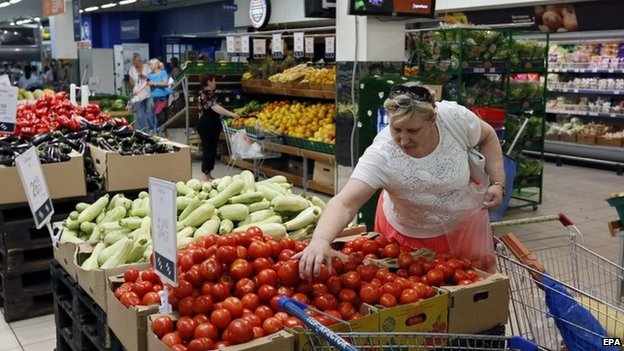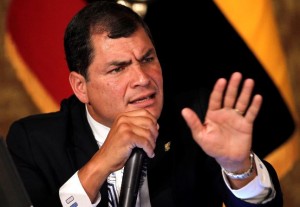
E.U. will pressure LatAm not to sell food to Russia
The European Union plans to lobby countries that could benefit from Russia’s bans on Western food imports, such as Brazil and Chile, to refrain from boosting their exports and stick to the international party line on Russia’s conduct in Ukraine, the Financial Times reported.
A senior EU official said at a briefing Tuesday (Aug. 12) that the 28-nation bloc “will be talking to the countries that would be potentially replacing our exports to indicate that we would expect them not to profit unfairly from the current situation,” the Financial Times (FT) reported.
Another official said that the talks would be “political” in nature, emphasizing the importance of a united international stance on Russia’s alleged aiding of separatist rebels in eastern Ukraine.

[President Rafael Correa of Ecuador said Tuesday that he will ask no one for permission to sell food to Russia, reported the Ecuadorean daily El Comercio.
“Far as I know, Latin America is not part of the European Union — not yet, anyway,” the newspaper quoted him as saying.]
In retaliation against Western sanctions, Russia last week banned imports of fruit, vegetables, fish, meat products, cheese, milk and dairy from countries with sanctions against Russia over its policy in Ukraine – namely, the European Union, the U.S., Australia, Canada and Norway.
As soon as the ban struck, commentators on both sides said that the Kremlin’s retaliatory measures were a shot in the foot: Russia depends heavily on foreign produce imports, especially during the winter months.
Moscow turned at once to Latin America for alternate supplies to mitigate the impact on Russian consumers. Last Thursday (Aug. 7), Russia’s agricultural watchdog, the Federal Veterinary and Phytosanitary Inspection Service, met with representatives of Brazil, Argentina, Ecuador, Uruguay, Paraguay, Peru and Chile on the prospect of increasing food imports from the region.
[For background in Progreso Weekly, click here, here and here.]

The move is already bearing fruit: Brazil in particular has authorized the immediate export of chicken, beef and pork from 90 meat plants to Russia, and expects to boost exports in other categories as well, the FT reported.
“Russia has the potential to be a large consumer of agricultural commodities, not just meat,” Seneri Paludo, Brazil’s Secretary for Agricultural Policy is cited by FT as saying. Russia may also increase procurement of corn and soya beans, he added.
Another country expected to benefit from the ban is Chile, which could take over from Norway as a major exporter of fish to Russia.
Despite being the world’s largest trading bloc, the EU has little influence, as its 15-year negotiations with Latin America’s Mercosur have been mired in difficulties over market access.
[The RIA-Novosti news agency quotes Nikolai Kaveshnikov, head of the Center for Political Integration at the Institute of Europe, as saying that the European Union lacks serious instruments to influence Latin American countries.
In addition, the leftist and anti-U.S. leaderships of many Latin American countries protect the interests of the Latin American business.
“All of these factors will work together, suggesting that Latin American food supplies are likely to come to Russian markets, substituting some of the European export products,” Kaveshnikov says.
Asked if the EU might deny freight insurance to Latin American ships carrying food to Russia, Kaveshnikov said that “the use of this instrument for political influence seems absolutely beyond belief.”]
The EU member states will meet in Brussels on Thursday (Aug. 14), where they are expected to work out a comprehensive response to Russia’s food embargo.


